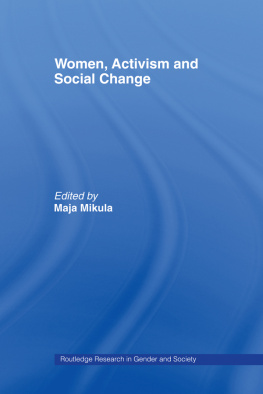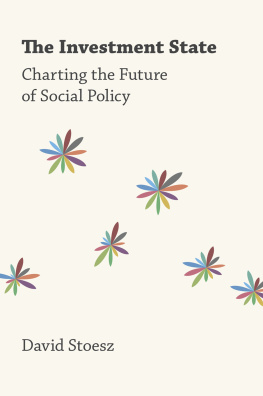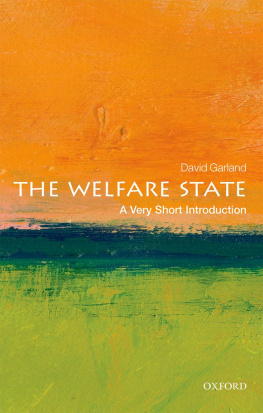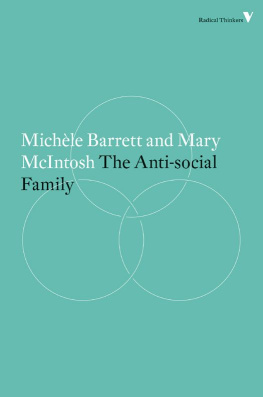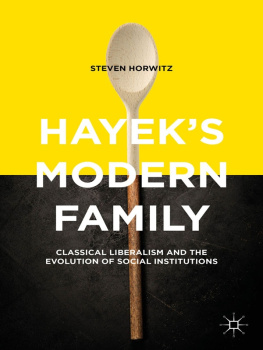Third printing 2012
Copyright 1988 by Transaction Publishers, New Brunswick, New Jersey.
All rights reserved under International and Pan-American Copyright Conventions. No part of this book may be reproduced or transmitted in any form or by any means, electronic or mechanical, including photocopy, recording, or any information storage and retrieval system, without prior permission in writing from the publisher. All inquiries should be addressed to AldineTransaction, A Division of Transaction Publishers, RutgersThe State University, 35 Berrue Circle, Piscataway, New Jersey 08854-8042. www.transactionpub.com
This book is printed on acid-free paper that meets the American National Standard for Permanence of Paper for Printed Library Materials.
Library of Congress Catalog Number: 88-22131
ISBN: 978-0-202-30351-2
Printed in the United States of America
Library of Congress Cataloging-in-Publication Data
Popenoe, David, 1932-Disturbing the nest.
(Social institutions and social change)
Bibliography: p.
Includes index.
1. FamilyCross-cultural studies. 2. FamilySweden. I. Title.
II. Series.
HQ518.P67 1988 306.8'5 88-22131
The subject of this book is the changing family in modern society. Is there any other current social topic so value-laden and vulnerable to the bias of personal experience? Perhaps not; the family, it has been said, is a kind of intellectual Rorschach blot. People project onto it their own attitudes and feelings. A caveat to the reader about "value-free" social science, therefore, seems especially important at the outset.
I consider detached objectivity to be the very highest goal of the sociological enterprise. Without this goal, sociology and the social sciences in general can lay scant claim to public acceptance and support to say nothing of social and intellectual influence. In this book I have sought to be objective to the best of my ability. I have tried to give the reader the empirical evidence, the logic, and the theory by which my main conclusions have been reached; and I have striven to examine issues from a variety of perspectives.
Yet the experience of the social sciences over the last few generations has clearly shown, in my opinion, that except perhaps in the narrowist of studies social scientists can seldom escape entirely from their own personal values. If nothing else, these values strongly shape the selection of subject matter that social scientists analyze. Thus it is a real disservice to the cause of science and truth when social scientists, as too often seems the case, profess a kind of absolute scientific objectivity that goes well beyond the known limits of social science thought as well as the realities of the human condition. Because of this, I am of the school (pioneered, incidentally, by the great Swedish social economist Gunnar Myrdal) that believes social scientists should be much more open and above-board about their personal values, indicating what their basic value assumptions are.
Perhaps in other areas of sociology such a caveat about the role of personal values is less important. But there are few areas in the social sciences so fraught with ideology and subjectivity as family sociology. The personal values of sociologists concerning the family range from open antipathy toward almost everything the family stands for to the opinion that the traditional family can hardly be improved upon. And the family itself is viewed "objectively" within sociology as an institution that ranges from being highly oppressive, concealing dangerous anti-democratic and anti-egalitarian attitudes, to one that is immensely liberating, inculcating the supreme values of human civilization.
It defies logic and human nature to think that the personal values of social scientists do not in any way shape their sociological views. In my experience, indeed, there are few other areas of sociology in which a scholar's personal life history so clearly comes out in his or her work. Historically, most analyses and interpretations of the family have been suffused with the special interests and biases of men. This is true, for example, of much of the writing that bemoans the loss of the traditional family. For men, the traditional family seems to have been a largely unconditional benefit (especially in conjunction with the double standard of sexual behavior), and it would seem that many men are not willing to give it up without a fight. In recent years more family analysts have been female; they too have often written from the point of view of their own gender. To many women the traditional family appears not so much a benefit as a cost, and it is not surprising that "the decline of the traditional family" has come to be viewed in a less negative, and indeed sometimes a totally positive, light.
What is often omitted from both of these gender-driven positions, however, is a consideration of the family from the perspective of the interests of children. As family scholars are no longer children, this is understandable; but it is nonetheless regrettable, for children could be said to be, after all, the main reason for the institution of the family in the first place. When I analyze the family I am realistic enough to know that I can never completely overcome my bias as an adult male. Yet to me the family is primarily a social instrument for child rearing, and I value "strong families" for that reason. I hold to the old ideal of parents living together and sharing responsibility for their children and for each other, if this book has any special, underlying perspective, therefore, it is that I have tried to consider the changing family and its effects, to the extent that I am able, with what I perceive to be the child's viewpoint particularly in mind.
The information on Sweden, a special focus of this book, is based on lengthy stays in that nation in 1984, 1985, 1986, and 1987, plus prior knowledge gained through extensive contacts with Sweden over a period of more than 15 years beginning with a Fulbright year in 1972-1973. During recent visits, intensive, unstructured interviews were conducted with over one hundred persons in many walks of Swedish life, including academics in a number of disciplines, political figures, social workers, journalists, census officials, marriage counselors, lawyers, and leaders of the women's movement. In addition, historical and contemporary literature pertaining to family trends and family policyboth in Swedish and Englishwas searched, the latest statistical data were gathered, and the most recent social science research was reviewed. As will be seen, there are still some major gaps in our knowledge of the Swedish family ' it should be noted that Sweden has what are probably the best family data in the world), but I have attempted to give the most up-to-date account possible about current Swedish family conditions.
To compare the situation of the family in Sweden with that of other advanced, Western nations, visits were made over the last 4 years and research materials gathered in nine other countries: Australia, Denmark, Great Britain, France, Iceland, the Netherlands, New Zealand, Switzerland, and West Germany. Much comparative material also comes, of course, from the United States. There are three broad types of comparative methodology: case studies, analysis of statistical and archival data, and studies employing standardized (usually survey) methods. In this work, I have conducted only the first two types, although available comparative survey materials have been extensively utilized. Statistical, archival, and survey data are presented throughout, and comparative case studies of three nations selected because of their traditional familismSwitzerland, New Zealand, and the United Statesare presented in later chapters. These comparative materials have strongly shaped my conclusions.


